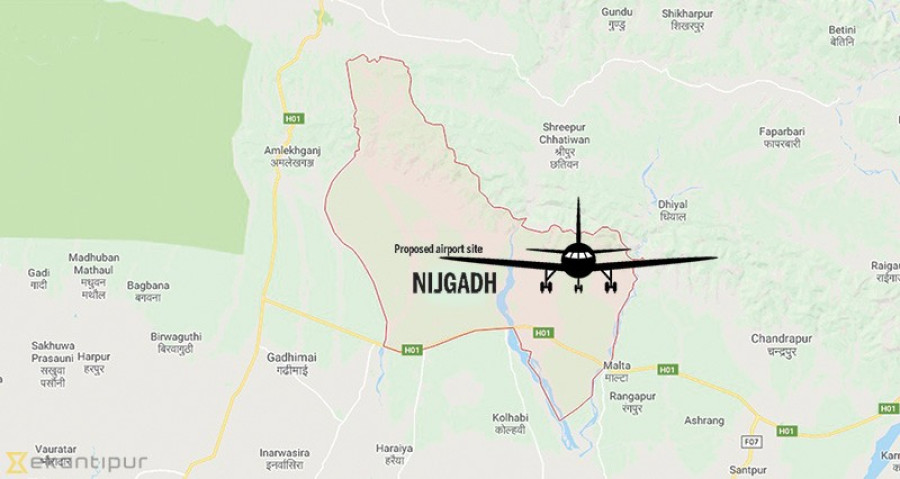Sun, Feb 22, 2026
Money
Nijgadh International Airport: Fresh report may cost state coffers Rs700m
The National Concern and Coordination Committee of the Upper House has directed the Tourism Ministry to prepare a fresh detailed project report of the proposed international airport in Nijgadh, Bara that may cost the government an ‘unnecessary’ financial burden of nearly Rs700 million.
bookmark
Sangam Prasain
Published at : December 20, 2018
Updated at : December 20, 2018 23:43
Kathmandu
The National Concern and Coordination Committee of the Upper House has directed the Tourism Ministry to prepare a fresh detailed project report of the proposed international airport in Nijgadh, Bara that may cost the government an ‘unnecessary’ financial burden of nearly Rs700 million.
The committee, which is entrusted with overseeing national pride projects, led by its Chairman Dil Kumari Rawal prepared the field report of the highly complex and controversial airport project.
In its report, the committee has directed the ministry to approve the detailed project report (DPR) within this fiscal year, ending mid-July in order to expedite the project’s development.
Few experts with whom the Post talked to said the DPR was a “waste of money” as no one would own the report prepared by the government.
Apart from the proposed DPR, the government also has to reimburse Rs700 million [inflation, interest and opportunity cost adjusted] to Korea’s Landmark Worldwide Company (LMW) that had already submitted a detailed feasibility study (DFS) to the government in August 2011.
It had acquired the contract to carry out the study in March 2010.
Experts said that the DFS particularly is a feasibility study that evaluates the project’s potential for success and is an important study to attract potential investors and lending institutions. It’s a complete document for investment decision-making, approval and planning.
On the other hand, a DPR is a document based on which further work on the project is carried out by the investor that evaluates the cost and benefits of the project internally. Normally, a DPR prepared by one investor or company is not owned by another. For example, an Indian company had prepared the DPR to develop the Kathmandu-Tarai Express Highway. However, after the government did not award the project to the Indian company, its DPR became useless.
“Even the Nepal Army, who is developing the project did not buy the DPR prepared by the Indian firm and decided to prepare its own,” said a source from the Civil Aviation Authority of Nepal (CAAN).
“Obviously, there will be need of the DPR but not one prepared by the government. The firm who will get the project will prepare the DPR on its own as per international practice,” he said. “Hence, the Nijgadh airport’s DPR is a waste of money.”
According to an official at the Tourism Ministry, it’s been two years since CAAN had invited bids to select a consultant to prepare the DPR. It shortlisted a few companies but the plan has been put on hold, fearing that it may attract interest of anti-graft bodies.
“There is no need to prepare two similar drafts by the government.”
“The government is yet to pay for the LMW’s report, and no one has said that the report is not workable,” said a senior official at the ministry. “Why does Caan want to spend a pile of money to produce another similar report?” he wondered.
The planned airport in Nijgadh, located 175 kilometres south of Kathmandu, will be spread over 80 square kilometres, which will be the biggest airport in South Asia in terms of areas.
Meanwhile, the committee submitted the field report to the Chairman of National Assembly Ganesh Prasad Timilsina with the conclusion that the tress around the airport should not be chopped down to make the airport city.
After carrying out field visit of the second international airport in Nijgadh and holding discussions with concerned stakeholders, the committee also directed the ministry to protect the land allocated for the construction of airport city in the name of the project.
Similarly, the committee has also directed the government to complete the construction of the airport within the given timeframe and should be not delayed under any circumstances.
The committee has also directed the ministry that the compensatory plantation of trees should be done with strict enforcement in the places where trees are felled for the development of the second international airport in Nijgadh.
More than 2.4 million small and large trees will have to be chopped down to build the swanky airport.
Most Read from Money
Upper house passes tourism bill with tougher Everest rules
Nepal’s share market faces unprecedented lockdown as regulators battle industry over trading rules
Cooking gas shortage persists in Valley ahead of polls
Gold and silver prices rise
TIA crosses 5 million international passengers for first time as migrant, student travel surges
Editor's Picks
Upper house passes tourism bill with tougher Everest rules
What Routine of Nepal Banda gets right, and what it gets wrong
The murky business of room finding in Kathmandu
Nepal’s share market faces unprecedented lockdown as regulators battle industry over trading rules
Ministries differ over extending Indian HICDP aid beyond local governments
E-PAPER | February 22, 2026
×




 22.69°C Kathmandu
22.69°C Kathmandu













